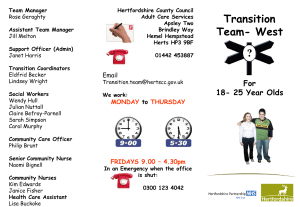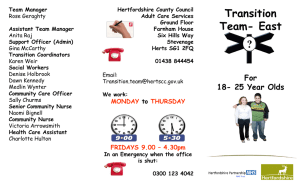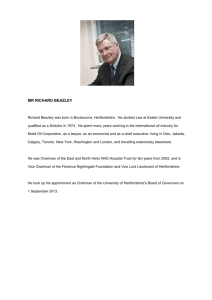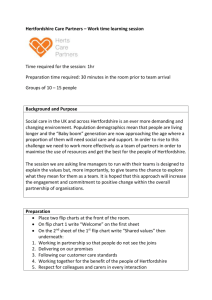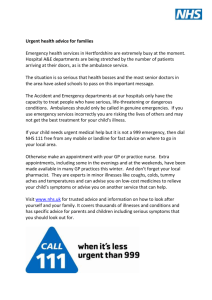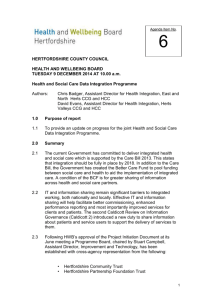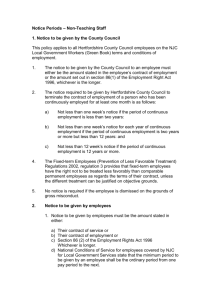Item 4b - Report & Background Papers
advertisement
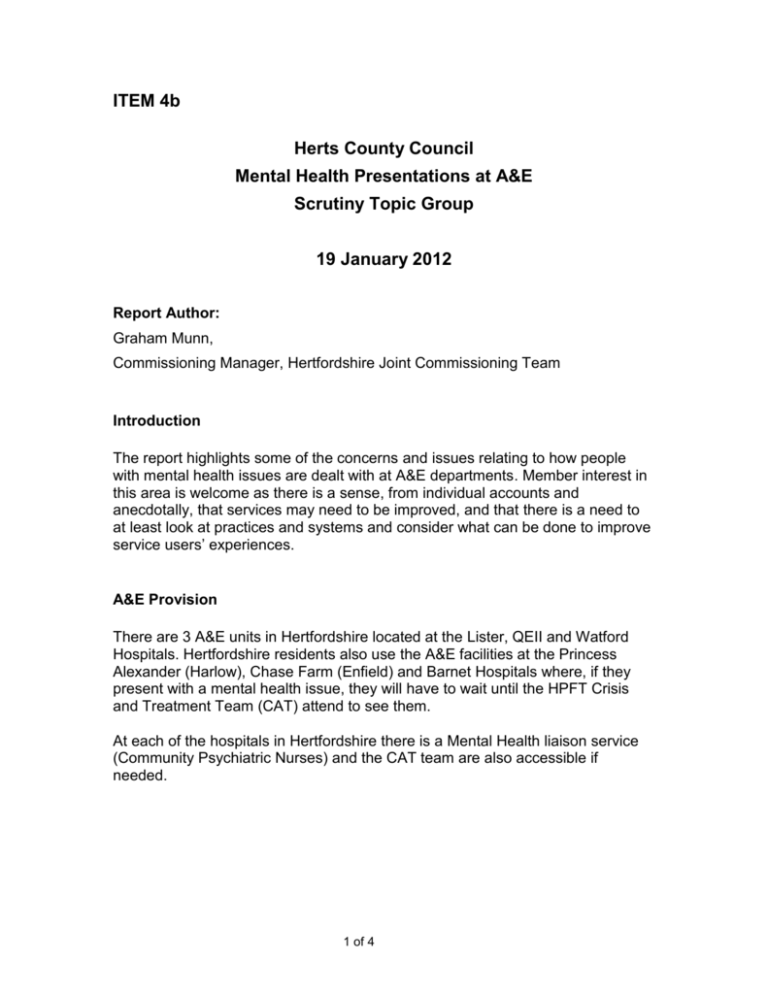
ITEM 4b Herts County Council Mental Health Presentations at A&E Scrutiny Topic Group 19 January 2012 Report Author: Graham Munn, Commissioning Manager, Hertfordshire Joint Commissioning Team Introduction The report highlights some of the concerns and issues relating to how people with mental health issues are dealt with at A&E departments. Member interest in this area is welcome as there is a sense, from individual accounts and anecdotally, that services may need to be improved, and that there is a need to at least look at practices and systems and consider what can be done to improve service users’ experiences. A&E Provision There are 3 A&E units in Hertfordshire located at the Lister, QEII and Watford Hospitals. Hertfordshire residents also use the A&E facilities at the Princess Alexander (Harlow), Chase Farm (Enfield) and Barnet Hospitals where, if they present with a mental health issue, they will have to wait until the HPFT Crisis and Treatment Team (CAT) attend to see them. At each of the hospitals in Hertfordshire there is a Mental Health liaison service (Community Psychiatric Nurses) and the CAT team are also accessible if needed. 1 of 4 Mental Health Presentations at A&E People go to A&E seeking help for a varied assortment of mental health conditions. In the main these tend to be for serious issues such as having taken overdoses of drugs (medication) and suicide attempts. In effect people are facing some form of crisis and attend A&E seeking help with this. For people who have a mental illness a crisis can be particularly difficult. Crisis may result from a variety of factors, such as deterioration in their mental and or physical health, or because of relationship problems or as a result of problems with practical day to day living issues such as financial or housing problems. Appropriate crisis services are needed especially where someone’s mental health has deteriorated to the extent that they may harm themselves or others and when they need intensive specialist support and treatment. In one study (Economic evaluation of a liaison psychiatry service by Sainsbury Centre for Mental Health *) in Birmingham of a hospital service for people presenting in a mental health crisis the reasons for presenting for help included: - Deliberate self-harm Depression Cognitive impairment, confusion, dementia Alcohol misuse Suicidal ideation Psychosis 27% 16% 13% 12% 10% 8% Why people present at A&E Units therefore may be the result of many factors and the above study provides at least some indications and understanding of the possible reasons. In addition, the Community MH services and GP’s may also be recommending to their service users and patients to go to the A&E especially at out-of-hours times (evenings and weekends) when its known that they will at least be seen by someone. Suitability of A&E units There are a number of possible reasons why A&E units aren’t right for people presenting with mental ill-health. These include: o Poor environment for an initial response to a crisis o Potentially unsafe, unfriendly, and stressful environments o The availability of specialist workers to carry out assessments may be limited. 2 of 4 o lengthy waiting times may be experienced o Poor environments for waiting to see specialist o Levels of anxiety, stress and difficult behaviour may be left unattended to while waiting to see a specialist. o The quality of the service provided by staff at A&E units – staff attitudes and practices - can vary o How well trained A&E staff are in mental health issues is a factor as is how well they are trained to deal with patients face to face. In the A&E units in PAH and Chase Farm people presenting there have to wait for a CAT team worker(s) to come to the hospital which may mean lengthy waits, and with no interim intervention from the hospital staff being provided because any treatment delivered is the responsibility of the Hertfordshire MH service. The CAT team that services these two A&E Departments report several deficiencies with current arrangements and some of these are explained in the following statement: “With regard to facilities I do not feel they are appropriate or safe as service users are screened by A&E then referred to us we have to respond with in 4 hours The information collected is minimal and on occasion the service user waits to see us only to report that they have run out of medication and need advice or they want to know what service to be signposted to. Other times they are left in an extremely distressed state even at our request to prescribe something to ease anxiety or distress we are told no as they are Hertfordshire patients the psychiatrist from both hospitals will refuse to see the service user if there are complications we have to arrange for the CAT doctor to review which in turn adds to the length of time the service user has to wait.” What Service Users Want from a Crisis Service Service users tend to be critical of the service they receive in A&E departments. In one study (Open All Hours, which evaluated a Psychiatric Emergency Team **) service users said they would like: o o o o o More sensitive services A speedy response available 24 hours a day, 7 days a week Where they can have face to face and telephone counselling Services at home 3 of 4 o Self-referral possible In the same study GPs, like service users, wished for “rapid access to an experienced professional’. They also advocated a single point of access to specialist mental health services. Leading by Design and Transforming HPFT Mental Health Services HPFT are in the process of re-designing their services to take account of many changes in Mental Health policy and practice. It is expected that these changes, which include a single point of access will lead to improvements in how crises are responded to. HPFT will have to work very closely with their various partners and colleagues in many different organisations, such as the A&E departments, in introducing these changes and are currently looking comprehensively at how to improve the ‘care pathways’ they provide for people experiencing mental ill health, from the times of crises through to recovering and discharge. Conclusion The interest of the Scrutiny Panel in this topic is most welcome. It is anticipated that its findings will contribute significantly to our understanding of the issues and what might be done to effect improvements in services and practices. References * Economic evaluation of a liaison psychiatry service by Sainsbury Centre for Mental Health ** Open All Hours, which evaluated a Psychiatric Emergency Team 4 of 4
